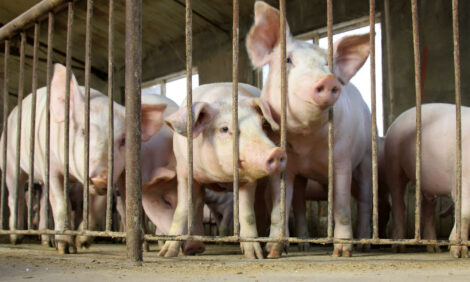



Prenatal Stress Leads to Stress-Prone Piglets
SCOTLAND, UK - Stress in pregnant pigs results in their offspring being 'stress-programmed' for life, research by at the Scottish Agricultural Colleges (SAC) has revealed.The findings of the five-year study have implications for pig welfare and production and may also add weight to the theory that stress experienced by pregnant women can impact negatively on their babies' development.
Researchers at SAC's Sustainable Livestock Systems Research Group studied the impact of pregnant sows' exposure to social stress, which may happen routinely on pig farms when unfamiliar pigs are mixed into new social groups or when competition between sows occurs when they are fed together. The offspring from stressed mothers were found to be more fearful and to react more strongly to stressful situations than those born to pigs which had not experienced prenatal stress.
The study, funded by the Biotechnology and Biological Sciences Research Council and the Scottish Government, also found evidence that the piglets' immune systems were affected, potentially making them more susceptible to disease; that they had a substantially slower rate of growth after being weaned; and that they showed poorer quality maternal behaviour with their own piglets, including a greater tendency to attack their young.
The researchers believe that these problems are caused by stress hormones in the pregnant animal crossing the placenta and affecting the brain development of the foetus, particularly during the second third of pregnancy. The study focused on piglets of first time mothers, known as gilts, which are often more likely to experience stress during pregnancy.
Dr Kenny Rutherford of SAC's Sustainable Livestock Systems Research Group, which led the study, said: "Our findings showed that factors such as social stress on pigs during pregnancy had clear, negative effects on the way their offspring deal with stress, their growth and their behaviour.
"The impact of maternal stress on the offspring's later health and welfare may currently be overlooked within some farming environments but our study found that changing certain conditions that pregnant pigs experience could lead to a win-win situation of improved welfare both for the mothers and their offspring, as well as increased farm productivity and efficiency.
"Our findings could also be relevant to theories about the impact of stress on pregnant women because brain development in foetal pigs and humans is similar and at birth, human infant and piglets' brains are at an equivalent developmental stage."
Dr Rutherford will share his findings with representatives of the UK pig industry, pig researchers and policy makers at SAC's Pig Research Knowledge Exchange event in Edinburgh later this month.
SAC has received funding from DEFRA to build on the research by examining how the experiences of pregnant farm animals (pigs, sheep, cattle, poultry and farmed fish) might have a negative effect on their developing offspring and to measure how common these are in normal commercial conditions. The three-year study will result in recommendations on the best methods of managing pregnant animals for the sake of their own welfare and that of their developing offspring.
SAC Pig Research Day
SAC is holding a Pig Research Day on 13 October (09:00 to 16:00) at Moredun Pentland Science Park, Moredun Research Institute, Penicuik, Midlothian.
The UK pig industry faces a number of challenges and opportunities, and its success and sustainability depends upon contributions from applied science. Therefore, SAC invites you to attend a workshop presenting recent research on pig health, welfare and nutrition with a specific focus on future research requirements to support the pig industry.
This event is supported by the Scottish Government under the SAC 'Success Through Knowledge' Campaign and admission is free.
For more information, click here.







